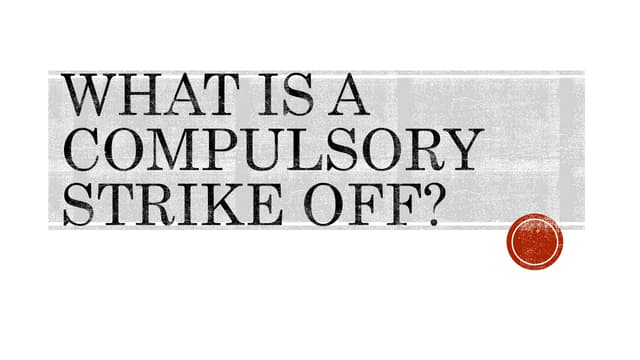Secret Steps in the Compulsory Strike Off Refine
Wiki Article
Understanding the Refine and Ramifications of Compulsory Strike Off Under Business Legislation
In the realm of firm legislation, the process and implications of obligatory strike off hold considerable weight for services and their directors. Understanding the complexities of why firms encounter such an end result, the precise actions entailed in the strike off procedure, and the far-ranging effects for all parties involved is vital in navigating the complicated landscape of company governance. As we explore the reasons behind obligatory strike offs, the occurring procedures, and the succeeding consequences, a clearer photo arises of the profound impact it can carry entities and people alike.Factors for Compulsory Strike Off
Required strike off under firm legislation is initiated by the governing authorities for details factors associated with non-compliance or functional irregularities. The key factor for a firm to face compulsory strike off is the failure to file annual returns or financial statements for an extended duration. This non-compliance indicates an absence of transparency and adherence to regulatory requirements, elevating issues concerning the company's monetary health and responsibility.
Process of Strike Off
Given the regulatory authority's initiation of obligatory strike off for various reasons, understanding the procedure of strike off is critical for business facing prospective dissolution under firm regulation. The process usually starts with the regulative authority sending notices to the business's registered workplace address, educating them of the upcoming strike off. It is necessary for the firm to address any kind of superior problems, such as submitting past due documents or resolving impressive fees, within the defined duration to avoid dissolution.
Effects for Companies
What are the ramifications for firms encountering compulsory strike off under firm law? Firms facing mandatory strike off might run into several considerable ramifications. The firm discontinues to lawfully exist, resulting in the loss of its corporate status and the going along with protections and advantages. This can cause the failure to enter into contracts, conduct organization, or seek lawsuits in the business's name.Furthermore, the company's properties at the time of strike off come to be home of the state, which can bring about financial losses for lenders and shareholders. Shareholders may shed their investments, while creditors might battle to recover any arrearages owed to them by the struck-off business.
Additionally, supervisors of the business may encounter disqualification from holding similar positions in other business for a given period (what is compulsory strike off). This can stain their specialist reputation and restrict their future service possibilities
Repercussions for Directors
Dealing with obligatory strike off under business legislation can have severe ramifications for supervisors, influencing their future roles in other firms and potentially staining their expert standing. Directors of a business facing required strike off may discover it challenging to secure directorial placements in other companies in the future. This is since the strike off indicates a failure to adhere to lawful obligations, compulsory strike off raising problems concerning the director's ability to fulfill their duties successfully. The stained specialist reputation resulting from a mandatory strike off can lead to a loss of trust from service customers, partners, and stakeholders. Supervisors might also encounter personal economic liabilities if they are found to have actually acted negligently or fraudulently, bring about prospective lawsuits against them. Overall, the consequences of compulsory strike off for supervisors prolong beyond the specific company concerned, affecting their job prospects and professional reputation in the long-term.Preventing Compulsory Strike Off

Final Thought
To conclude, recognizing the process and effects of mandatory strike off under business law is necessary for firms and directors to ensure conformity with guidelines. By knowing the factors for strike off, the procedure involved, and the repercussions for all parties involved, firms can take steps to stay clear of being subject to required strike off. It is necessary for directors to be proactive in maintaining appropriate documents and conference legal obligations to prevent the risk of strike off.Provided the regulatory authority's initiation of obligatory strike off for different factors, recognizing the process of strike off is vital for firms encountering prospective dissolution under firm law.What are the implications for companies facing mandatory strike off under business legislation?Dealing with required strike off under business legislation can have extreme implications for directors, affecting their future roles in other business and potentially tainting their professional standing. Supervisors of a company dealing with obligatory strike off might discover it testing to safeguard directorial settings in other companies in the future.In final thought, recognizing the process and effects of obligatory strike off under business law is essential for firms and directors to guarantee compliance with guidelines.
Report this wiki page